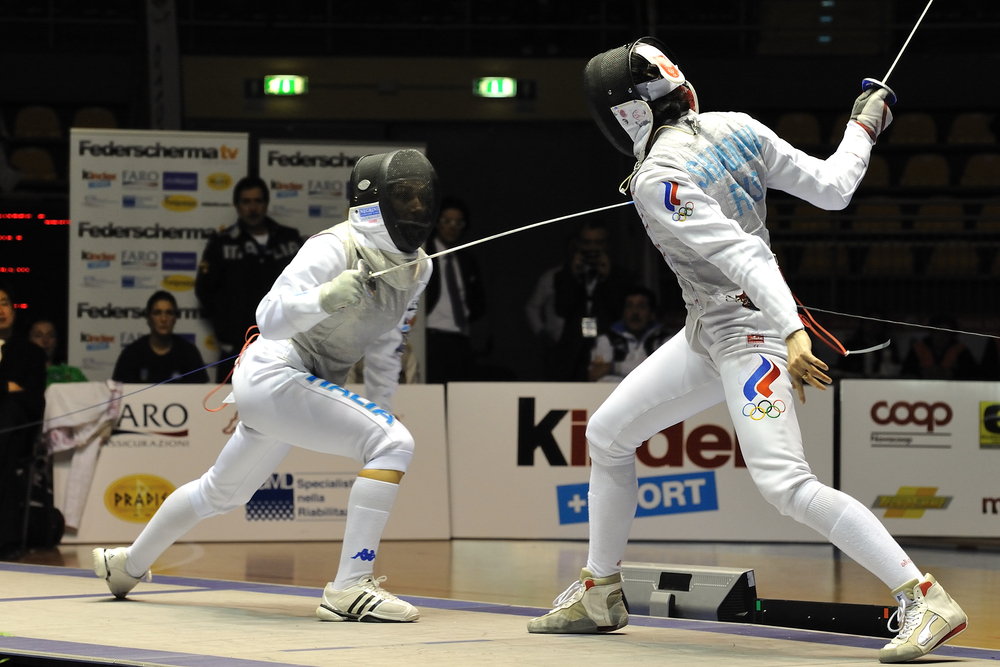
Get Paid to Share Your Expertise
Help shape the future of business through market research studies.
See Research StudiesOlympic fencer Keeth Smart ’10 talks about his transition from professional athlete to fitness technology entrepreneur.
Keeping opponents on their toes — literally — with his lightning-quick footwork, fencer Keeth Smart ’10 captured the silver medal at the 2008 Summer Olympic Games in Beijing, becoming the first American to win a medal in men’s fencing since 1984 and the first to win it in his specialty, sabre fencing, in 60 years. It is with this same skill and dexterity that Smart, now 38, has pivoted from the mat to the market, most recently making a foray into entrepreneurship.
“I made a decision going into the 2008 Beijing Olympics that it would be my last quadrennial,” he explains. “Physically, I know I could have made the 2016 team, but mentally I was just burning out.” During his final training year, he laid the groundwork for a drastic career change—and hasn’t looked back since. After working in wealth management at Bank of America for five years, Smart has recently launched Physiclo, a fitness technology company that creates a line of workout clothing with built-in resistance bands to offer more intense workouts. This month, with the summer Olympics in Rio underway, Smart reflects on his transition from Olympic champion to entrepreneur.
 What are some of the similarities between competing at a high level in athletics and succeeding in business?
What are some of the similarities between competing at a high level in athletics and succeeding in business?
The similarities are unbelievable. Business is all about hard work. In preparing for the Olympics, the ones really making it are the ones working the hardest and really pushing themselves. At the same time, in both, you want to be efficient but you don’t want to burn out.
In both business and athletics, it’s crucial to have a strategy. In business school, people knew me as someone who liked to do a lot of research. That comes from fencing. When you’re fencing, an opponent may come at you with a move they haven’t done in awhile so you want to be prepared. In business, you never want to be blindsided — whether you’re going into a meeting or going into a pitch, you want to be prepared for every possible question.
At the same time, you have to be adaptable. When you’re competing, you never know what’s going to happen. It’s great to have a game plan, but you have to understand that you can’t be married to that game plan. Being adaptable is crucial now with my post-Olympic career, too. For instance, I might have been close to winning a deal and it didn’t happen, so I have to be flexible to change my thinking. You’re constantly being flung different scenarios, so you have to adjust on the fly.

Why choose business school as opposed to, say, another type of graduate or professional school?
While I was in training, I took advantage of the Athlete Career Program run through the International Olympic Committee. Through that and throughout my fencing career, I met various mentors who were former athletes, who told me, “Business school will give you all the tools you need. So whether you want to open your own fitness gym or go into finance, it will open up so many more opportunities.” Among them were two other Columbia Business School graduates: Robert Dow ’74, who competed in the 1972 Olympic games, and David Rosenberg ’02, who won three US Team National Fencing Championships.
When did you decide to go to business school?
I made the conscious decision to start studying for the GMAT while I was still training. Instead of hanging out and playing video games, I could hang out and be more productive. I was living on the road for seven months out of the year. In fact, I was in St. Petersburg, Russia, when I applied. The Internet connection wasn’t the best — I was like, I hope it goes through and I don’t get hacked. Columbia was the only school I wanted to go to; I just loved the culture, and the alumni seemed so engaged.
Do you miss competitive fencing?
I retired when I was ranked number two in the world. But I 100-percent wanted to go to business school and not have any regrets. Right now with my business, I’m working with a lot of Olympians, so that’s exciting. But I miss being around my teammates. I miss the practice and the everyday team progress being made. I also miss having a coach who is holding me accountable and holding me to the highest possible standards.
Now that you’re not on the road, what’s your daily life like?
I live in Brooklyn with my wife, Shyra, and daughter, Taylor. I basically spend my time running my fitness technology company, Physiclo, and chasing after my toddler in playgrounds across Brooklyn.
Will you be watching the Olympic fencing competitions?
Yes. I like to watch it on multiple screens at once. I know the team members — some of them were on the team in 2008. I’m constantly texting with the athletes in Rio, and they’re telling me what’s going on.
Are you still involved with fencing in any way?
Yes. On Saturdays from September through June, I teach a fencing clinic at the Peter Westbrook Foundation, which teaches fencing to young people from underserved communities. I lead them through warmups and also train them in the more technical aspects of fencing. [Peter Westbrook is where Smart and his sister, Erinn Smart, also an Olympic fencer, were first introduced to fencing.] Read more about how Keeth Smart got his start in fencing.
Ivy Exec is proud to announce its partnership with Columbia Business School, to bring an insightful collection of thought leadership pieces for the modern-thinking strategist in finance, leadership and more to its platform.

 Columbia Business School
Columbia Business School